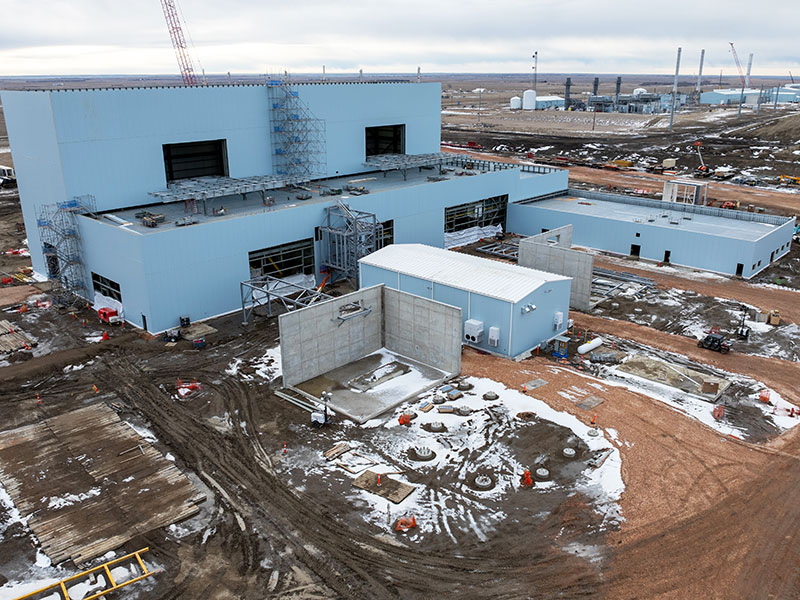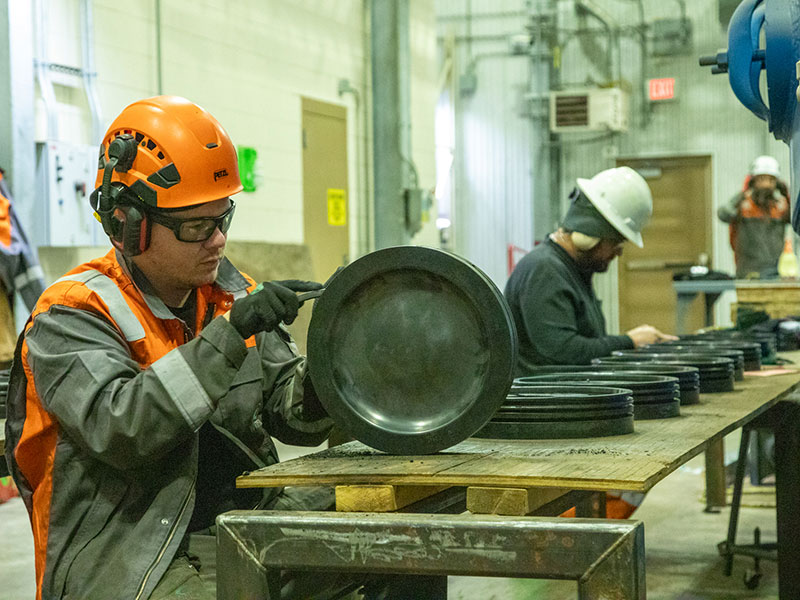- Products
- About
- Responsibility
- Environment
- News
- Contact us
- Careers
-

Basin Electric has found the best solution to meet members’ power supply needs is through an all-of-the-above energy strategy using dispatchable and non-dispatchable resources. As Basin Electric’s membership continues to grow, one resource is proving it’s a critical piece of the cooperative’s all-of-the-above energy strategy, and that is natural gas generation.
As electricity needs are ever-growing and market volatility is increasing, dispatchable natural gas-fueled facilities have become more and more valuable. Natural gas generation has a unique ability to swiftly respond to changing load demands, serve as both peaking and intermediate generation, and complement renewable energy sources.
Joe Fiedler, Basin Electric manager of Distributed Generation, describes how the cooperative’s natural gas-fueled units keep electricity reliable. “Most of the units in distributed generation are fast-start units. The jet engines have a 10-minute start up, and the reciprocating engines also have a 10-minute start up. These units are used for variable load. They’re dispatched and started quickly, and then they follow the load that’s needed for generation. They’ll follow the wind; they’ll follow the times of day when demand is higher, or demand is less,” he says. “So not only are they quick dispatch, but they’re also used for regulation during the day to take care of the grid needs more readily than what some of the baseload units can.”
Basin Electric’s seven natural gas-fueled resources are spread throughout Iowa, Montana, North Dakota, South Dakota, and Wyoming. Culbertson Generation Station, Lonesome Creek Station, and Pioneer Generation Station in northwest North Dakota and eastern Montana have been running more frequently recently to keep electricity reliable in the growing Bakken region of western North Dakota. The facilities are critical for alleviating congestion issues in the region.
Valerie Weigel, Basin Electric vice president of Energy Markets, explains why it’s important the units are ready to run. “We’ve progressively entered periods of heightened awareness (advisories, conservative operations, etc.) sooner each of the preceding five years, whether it’s from load growth on the system, units on outage for maintenance, weather related events, or increased congestion from the scaling of variable energy resources. That means our natural gas and peaking units are seeing increased run time and are even more critical. Grid conditions aside, we are seeing increased run hours on natural gas and peaking units. This highlights the importance of maintenance as it impacts our ability to utilize the units. Joe Fiedler and his staff do a great job ensuring our units are available when they’re called upon. Even when they’re not called upon, unit availability is relevant, and they’ve done a fantastic job ensuring the units are available,” she says.
In October 2023, Basin Electric’s board approved the purchase of spare engines for Lonesome Creek Station and Pioneer Generation Station. The spare turbines were ordered to keep on site for the ability to get the units back online again quickly in case of failure. Equipment will be able to be changed out more quickly than sending it in for repair, a process which can take months.
Fiedler explains the importance of the investment in the spare turbines. “These are jet engines that GE will build. They are direct replacements for the units we are running at those sites. These spares will give us some flexibility and improve our reliability if we have a major failure on an engine. These engines can be changed out in a manner of seven days or so compared to taking the engine out and disassembling it or sending it in for repair which can sometimes take months,” he says.

Because the cooperative has been using the natural gas generation facilities heavily, the environmental, Generation, and Marketing teams have been working together to manage these units to ensure they are in compliance with environmental constraints. All the cooperative’s generation facilities have controls in place to ensure environmental regulations are met or exceeded under state programs.
Erin Dukart, Basin Electric director of Environmental Services, says her team works with the Generation and Marketing teams to maintain compliance. “Our facilities have limits on the amount of fuel they combust to ensure that our NOX emissions on a 12-month rolling basis do not exceed a certain amount. At the newer units, we’re limited in how much they can operate in order to limit the amount of CO2 they’re producing. We are in communication with the Marketing group on a daily and weekly basis to see how these units are in relation to the emission limits or to the run-time limits,” she says.
Natural gas generation has allowed the cooperative to provide both stability and adaptability to meet members’ changing needs. Basin Electric is committed to investing in maintaining reliability and ensuring environmental compliance as it continues to integrate the resource into its energy strategy, providing the reliable and affordable electricity members depend on.
Dakota Gasification Company
Headquarters:
1717 East Interstate Avenue | Bismarck, ND 58503-0564 USA
701.223.0441 | 1.800.242.2372
Great Plains Synfuels Plant
420 County Road 26
Beulah, ND 58523-9400 USA
701-873-2100
A subsidiary of:
Basin Electric wants all interested and qualified candidates to apply for employment opportunities. If you are an applicant with a disability who is unable to use our online tools to search and apply for jobs, or who needs other assistance or accommodations, please contact us at 701-223-0441. Please indicate the specifics of the assistance needed or provide your contact information, and a Basin Electric Human Resources representative will contact you. Basin Electric is an Equal Employment Opportunity Employer regarding race, color, religion, sex, sexual orientation, gender identity, national origin, disability, and veterans status.